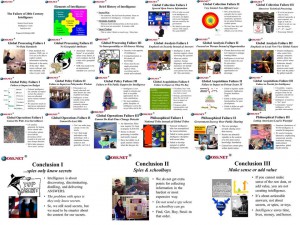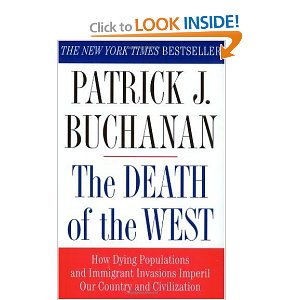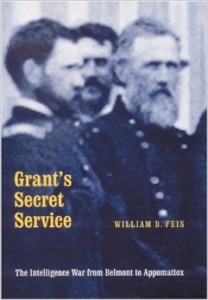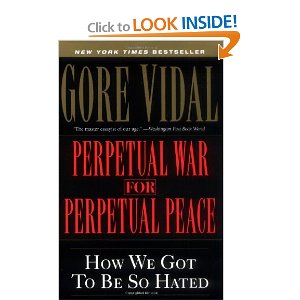
BRIEFING: 2002 Steele Failure of 20th Century Intelligence
Continue reading “2002 FAILURE of 20th Century Intelligence”

The truth at any cost lowers all other costs — curated by former US spy Robert David Steele.

BRIEFING: 2002 Steele Failure of 20th Century Intelligence
Continue reading “2002 FAILURE of 20th Century Intelligence”

Greg Palast
![]() Let Freedom Ring–Truths the Corporate Thieves Can't Hide
Let Freedom Ring–Truths the Corporate Thieves Can't Hide
May 29, 2002
The most distressing aspect of this book, written by an American expatriate publishing largely through newspapers in the United Kingdom, is that all of this information should have been published in U.S. newspapers in time to make a difference–to inform the voting public–but was not. One can only speculate how corrupt our media have become–how beholden to their owners and advertisers–if we cannot get front page coverage of the Florida government's disenfranchisement of over 50,000 predominantly black and democratic voters, prior to the presidential election; or of the raw attacks on our best interests by the International Monetary Fund, the World Trade Organization, and others linked in a “trigger” network where taking money from one demands all sorts of poverty-inducing and wealth theft conditions.
Even more timely are his stories about the current Administration continuing a practice of the former Administration, spiking, curtailing, forbidding intelligence investigations into Saudi Arabian government funding of bin Laden's terrorism as well as Pakistani production of the “Islamic” atomic bomb.
His exposes of corporate misdeeds, some criminal, some simply unethical, all costing the U.S. taxpayer dearly, are shocking, in part because of their sleaziness, in part because our own newspapers do not dare to fulfill their role as envisioned by the Founding Fathers, of informing and educating the people of this Nation upon which the government depends for both its revenue and its legitimacy.
Although I take this book with a grain of salt (wondering, for example, why he did not ensure that Gore's campaign had all that he could offer in time to challenge the vote disenfranchisement as part of the Supreme Court case), there is enough here, in very forthright and sensible terms, to give one hope that investigative journalism might yet play a role in protecting democracy and the future of the Republic.


![]() Hard Truth–Left, Right, or Independent, It Is The Truth
Hard Truth–Left, Right, or Independent, It Is The Truth
May 29, 2002
Patrick Buchanan
Patrick Buchanan has impressed me enormously with this book. For one thing, he has his facts right. The English-speaking peoples, as Churchill called them, and the Caucasian peoples, as our Russian colleagues as well as Europe might be inclined to describe them, are not replenishing their populations. Immigrants have been a blessing to this country (my mother, for instance), but in the absence of a judicious combination of repopulation, immigrant integration, and sustained civic duty by the larger population, we become hollow and fragmented.
Most interestingly to me, Patrick Buchanan and Lee Kuan Yew, former Premier of Singapore, perhaps the most intelligent man in Asia, are in total–and I do mean total–agreement on the vital importance of the family as the foundation of civilization and continuity. I grew up in Singapore, and have extremely deep feelings of respect for Lee Kuan Yew, and what I see here is two men, as far apart as the earth and philosophy might separate them, who agree on the one core value apart from religion (it does not matter which religion, only that one respect within a religion): FAMILY. Family is the root of cultural continuity and civil sustainability, and if we allow the traditional nuclear family to enter into minority non-replenishment status, we are in fact destroying the Nation.
Patrick Buchanan speaks of how we are no longer one nation under God–or one nation, period. There is a great deal to what he says. For one thing, Mexico has reclaimed American territory all the way up to the Guadalupe-Hidalgo treaty line, and the at least one major Republican family seems to be an active element in support of Mexico's illegal as well as legal immigration subversion of America. For another, and Joel Garreau did this in his book by this title, very intelligently, America is geographically, culturally, and economically really NINE nations in terms of geophysical and cultural separation.
The author also alludes to the growing separation between the federal government, which is agreeing to supra-national deals that hurt the states and the population at large–or refusing to sign off on deals (e.g. the Kyoto Treaty) that would actually benefit future generations. One is left with the feeling that we have three different Americas–the federal bureaucracy, the state-level authorities, and the people, and somewhere in here our methods of governance are failing to reconcile the behavior of the first two with the values of the third–in part because the people are all over the lot in terms of values, and we have lost our social cohesion.
Bottom line: he may never be President, but Patrick Buchanan speaks to the core of American values, and he must always be respected and listened to at the high table of American politics.


William B. Feis
4.0 out of 5 stars Well-Intentioned, Terrible Maps and No Timelines, May 28, 2002
I do not regret taking the time to read this book, and it is a well-intentioned worthy effort–however, given a new choice, I would probably go with the alternative, by an intelligence professional, “The Secret War for the Union: The Untold Story of Military Intelligence in the Civil War.”
I give the author, not an intelligence professional, high marks for the research, the story-telling, and the consistent themes. I give the editor and publisher low marks for the terrible maps (many seem to have lost their unit location markings and other key annotations) and the lack of tables showing “who knew what when…”
Three themes stayed with me as I put the book down:
1) A great deal can be accomplished in terms of intelligence with even a very small number of people–as few as 1-2 on staff, 3-5 behind the lines. We in America have substituted billions for technology and a cast of close to 100,000, for rather poor intelligence and counterintelligence.
2) Maps, especially “information maps,” are worth their weight in gold. I was reminded by this book that intelligence has in the past been an off-shoot of topographical engineering and map making, and do believe that we must restore the “hard-wired” connection between geospatial information and the “data” that our human, imagery, and signals professionals seek out.
3) Deserters, prisoners, and legal travelers are a gold mine of information and must, must, must be systematically exploited. No matter the degree to which they may offer up untruths and deceptions, the bottom line is that any commander who fails to plan for the systematic exploitation of these human resources, and to do so in a timely fashion, is derelict in their duty. As I recall, we do not yet have a proper table of organization or equipment in the U.S. force inventory for handling such individuals–the worst battalion, or the over-burdened military police, or some kludge collection of reservists, seems to end up being the solution each time. This dereliction is even more costly in “low intensity” environments.
I will not make too much of it, but I was especially pleased to see how much of Grant's intelligence came from enemy newspapers.
The author seeks to make much–perhaps too much–of how Grant did not allow himself to be immobilized by a lack of intelligence, substituting initiative when intelligence was lacking, but I for one don't buy it. What I see in the book is a substantive appreciation by the General Commanding of the role of intelligence, however poorly manned or funded, and that makes all the difference.


Gore Vidal
5.0 out of 5 stars You Get the Government You Deserve…., May 28, 2002
This book should be read in conjunction with Greg Palast's The Best Democracy Money Can Buy Vidal's book should be subtitled “you get the government you deserve.”
I cannot think of a book that has depressed me more. There are three underlying issues that make this book vitally important to anyone who cares to claim the title of “citizen:”
1) Citizens need to understand what their government is doing in the name of America, to the rest of the world. “Ignorance is not an excuse.” All of the other books I have reviewed (“see more about me” should really say “see my other reviews”) are designed to help citizens evaluate and then vote wisely in relation to how our elected representatives are handling national security affairs–really, really badly.
Continue reading “Review: Perpetual War for Perpetual Peace – How We Got to Be So Hated”
OSINT 101: Overview of the World of Information
OSINT 101: Internet and Commercial Online Exploitation
OSINT 101: Competitive Intelligence Analysis Tools & Web-Sites
OSINT 101: NATO Lessons Learned
OSINT 101: Desktop Tools for Smart People
OSINT 101: Geospatial Information Sources
I am reminded of how the U.S. Secret Service ran amok against so-called “hackers” (the best of them trained at MIT and now multi-millionaires) because it did not understand that hackers are like astronauts, pushing the edge of the envelope, and it did not understand that it was the U.S. communications and computing industry that was criminally negligent in offering the consumer and the government a national information infrastructure that was incredibly fragile and full of security holes. It was industry that failed to exercise due-diligence, and it was hackers that exposes these flaws well in advance of the Y2K panic. The anti-globalization activists, Lori Wallach among them (and she has clearly influenced Soros in this book) are the 21st Century hackers for world peace and prosperity.
Globalization and consumerism threaten billions of Arabs, Chinese, Indians, Muslims, and Russians around the world–and thus they threaten us as well. Although many brilliant minds foresaw these challenges in the 1970's, among them those speaking to the limits to growth, sustainable growth, and the need for new forms of world governance, it is only after 9-11 that the world appears ready to listen to George Soros and others who understand that we cannot continue to emphasize short term corporate profit over long term citizen survival.
His proposals for Special Drawing Rights are helpful, and merit adoption. It is with a little concern, however, that I see his concession to “elite” management of these remedial resources. I lean toward the view that the people are now both informed and connected, and that we must empower down to the neighborhood level if we are to restore civil society around the world (this includes no longer supporting repressive governments for the convenience of our corporations), so there is still a gap between Soros and the natural leaders down in the ranks with the people.
Thomas Jefferson said that “A Nation's best defense is an educated citizenry.” Justice Brandeis said that the greatest threat to a nation's liberty is “an inert citizenship.” George Soros may be said to be the first and foremost educator and leader on the critical matter of whether of whether or not this Nation might yet surmount great challenges of its own making.
